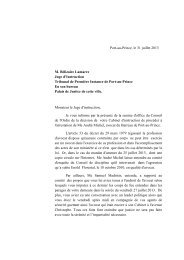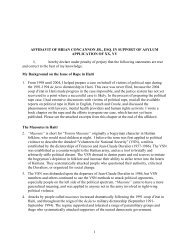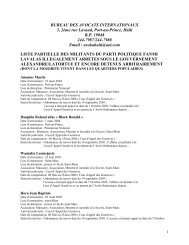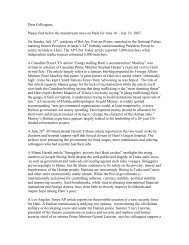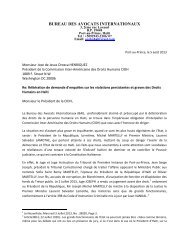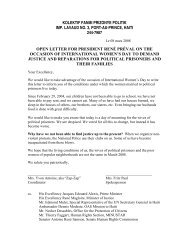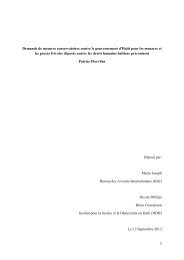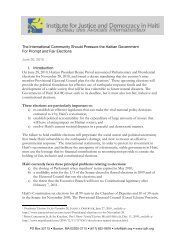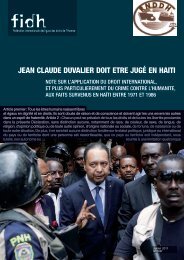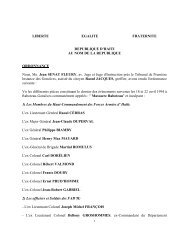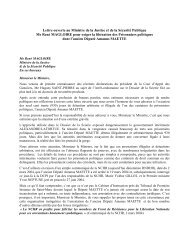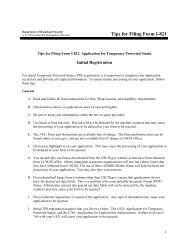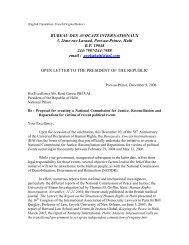Peacekeeping without Accountability - Yale Law School
Peacekeeping without Accountability - Yale Law School
Peacekeeping without Accountability - Yale Law School
- No tags were found...
Create successful ePaper yourself
Turn your PDF publications into a flip-book with our unique Google optimized e-Paper software.
to hear such a complaint. 196 The petition askedfor the establishment of a fair and impartialstanding claims commission as well as monetarycompensation for injuries suffered. 197The U.N. acknowledged receipt of theclaims after they were filed, but did not respondsubstantively until February 20, 2013, when itsummarily rejected the complaint, claiming that itwas “not receivable” because the claims touched ona “political and policy matter.” 198 In its statement,the U.N. made no mention of its own contractualobligation to establish a claims commission to hearprecisely the type of complaints Haitians seek tobring. As a result, Haitians affected by an outbreakstemming from the U.N.’s own actions may nowhave no forum in which to seek redress.The SOFA’s claims commission is vital toredressing the cholera outbreak for three reasons:(1) because the U.N. was contractually requiredto do so; (2) because the cholera victims’ injuriesare exactly the kind of claims such a commissionshould be tasked with hearing; and (3) becausethe U.N.’s failure to create a claims commissioneffectively forecloses all other avenues of relief.1. MINUSTAH Was Required by Its Own Contractto Create a Claims Commission.As it has in at least 32 peacekeeping agreementssince 1990, the U.N. promised the creation of aclaims commission in the SOFA it signed with theGovernment of Haiti when MINUSTAH was createdin 2004. 199 In Paragraph 55, which is titled “Settlementof Disputes,” the agreement promises that:Except as provided in paragraph 57 [whichcovers disputes between MINUSTAH andthe Government of Haiti over interpretationof the SOFA], any dispute or claim of aprivate-law character, not resulting fromthe operational necessity of MINUSTAH, towhich MINUSTAH or any member thereofis a party and over which the courts of Haitido not have jurisdiction because of anyprovision of the present Agreement shall besettled by a standing claims commission tobe established for that purpose. One membershall be appointed by the Secretary-Generalof the United Nations, one member by theGovernment and a chairman jointly by theSecretary-General and the Government. 200As in the model SOFA, the MINUSTAH SOFAcontemplates a claims commission that is standingand mandatory. In addition, like the modelSOFA, the MINUSTAH SOFA requires at least oneadjudicator who is not appointed by the U.N. inorder to ensure impartiality in the adjudication.2. A Demand for Individual Redress for theIntroduction of Cholera Is a Prototypical“Dispute of a Private <strong>Law</strong> Character” asContemplated by the SOFA.Paragraph 55 of the MINUSTAH SOFA limits thejurisdiction of claims commissions to “dispute[s]or claim[s] of a private law character.” The choleravictims’ complaints clearly constitute privatelawclaims squarely within the jurisdiction ofthe claims commission. The core of the claims—namely, requests for compensation for illness anddeath of private citizens resulting from improperactions by peacekeepers that led to contaminationof the Haitian water supply—sound in tort, aclassically private law domain. 201Characterizing the victims’ claims as “disputesof a private law character” is consistent withaccepted understanding of the distinctionsbetween public and private law. For example, akey distinction between public and private lawclaims is the identity of the complainant. Publiclaw claims may exist between governments or beinitiated by a public authority. By contrast, privatelaw claims are brought by private citizens. 202 Therequested remedy also sheds light on whetherthe claim is public or private in nature. In thiscase, the victims’ claims were for monetarycompensation, 203 a traditional private law remedy.This conclusion comports with guidance fromthe Secretary-General on the application of claimscommissions to disputes of a private law character.This guidance cites “third party claims forcompensation for personal injury/death or propertyloss/damage” as the kind of dispute a claimscommission should hear. 204 Because the choleravictims’ claims were claims for compensation for31the requirement of a claims commission



